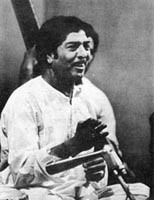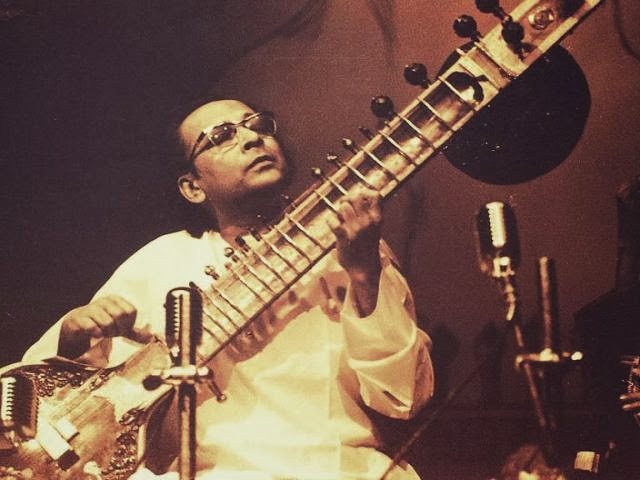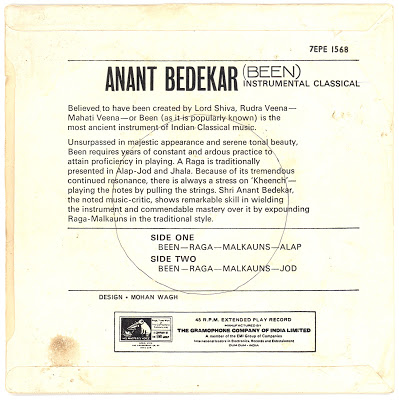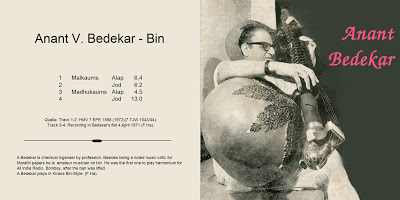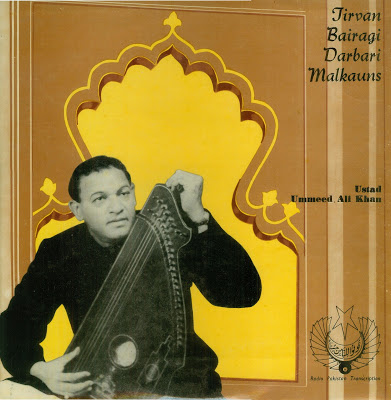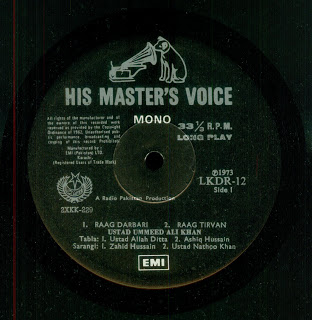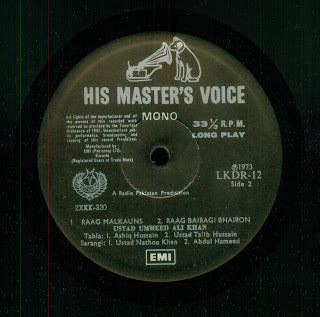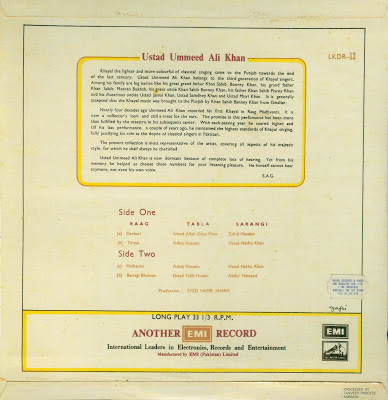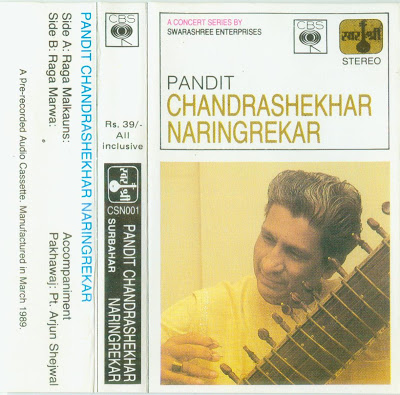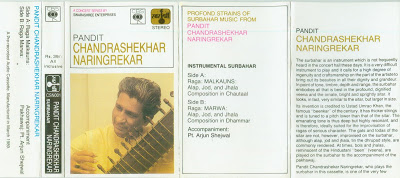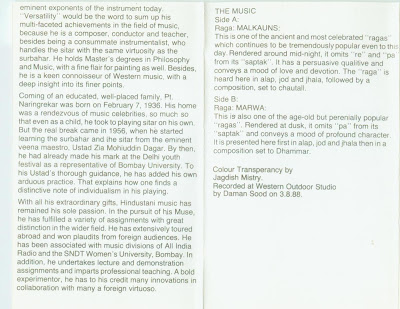1. Raag Darbari (14:36)
2. Raag Tirvan (11:00)
1. Raag Malkauns (13:21)
2. Raag Bairagi Bhairon (12:14)
Ustad Ummeed Ali Khan was a true blue Gwalior. His father Ustad Meeran Baksh was the son of Ustad Boorey Khan, who was nephew of Ustad Banney Khan whose sons Ustads Jamal Khan, Misri Khan and Saindhey Khan were all renowned gharanedar Gwalior khayaliyas. Ustad Haddu Khan was the grand Uncle of Ustad Banney Khan who incorporated many traditional punjabi folk compositions into khayal bandishes. Ustad Ummeed Ali’s only connection with Patiala Gharana was that he sometimes used to perform in jugalbandi with Ustad Ashiq Ali Khan. Many anecdotes of their friendly rivalry but I’ll leave them for later.
In his later years Ustad Ummeed Ali had lost his eyesight (it seams that this is incorrect, he rather lost his hearing) completely. Yours truly saw him travelling in a tonga many times along with Ustad Natthu Khan sarangiya to the Lahore radio station. That’s where I heard him singing all those wonderful raags like Tirvan, Champak and Neelambari (mitwa baalamwa — still rings in my ears ! ) etc. One only can hope that those recordings exist in radio archives somewhere !! For recordings try your luck with some firanghs who manage to slither into the radio archives one way or another !!"
http://www.parrikar.org/vpl/?page_id=487
Addeded in February 2019:
Remembering Ustad Umeed Ali Khan
SAEED MALIK JUL 16TH, 2005
WEEKEND MAGAZINE
From late 1930s to the middle of 1970s, Ustad Umeed Ali Khan ranked high in the hierarchy of classical vocalists of the sub-continent. He was known for his passion and ability for promoting and popularising the Gwalior gharana style of kheyal singing.
A large number of votaries of art music were drawn to his style of kheyal singing and progressive delineation of the thematic structures of the ragas. Not many even among senior citizens fully know about the achievements of that one-time great vocalist. Only on rare occasions, do we hear his recorded music broadcast by the second channel of Radio Pakistan, Lahore.
The kheyal style of singing has, with the passage of time, proliferated and metamorphosed into several schools or gharanas of professional musicians, differing in intonation, musical idioms, aesthetics and quality of music.
The oldest school of kheyal singing, the Gowaliar gharana, is distinguished by open-throat singing, formal simplicity and straight, linear transition from one note to another.
The descendents of Mian Taan Sen (who is reportedly buried in Gowaliar) are reputed to have perfected this mode of classical melodic _expression. Born in village Jandiala Guru in the district of Amritsar (East Punjab) in 1914, in a family of professional musicians, Umeed Ali grew up under the commanding shadow of his father Ustad Piyare Khan from whom he received initial training in the art of kheyal singing.
Ustad Piyare Khan had been groomed by his father Meeraan Bakhsh, a follower of Gowaliar gharana kheyal traditions. Later, the late Piyare Khan reportedly also benefited from the melodic wisdom of Jarnail Ali Bakhsh Khan, the co-founder of the Patiala gharana of kheyal singers. Like his father, Umeed Ali Khan was also gifted with sweet, rich, lively and forceful voice, which he dexterously used in the promotion of Gowaliar style of classical singing. Years of hard training under the supervision of his father made Umeed Ali Khan's style highly sophisticated and refined.
His performances brimmed with short, sparkling melodic phrases and vigorous taans, which were drenched in the tunefulness of his vocals. Like his father, Ustad Umeed Ali Khan was a tall, well-built and handsome musician.
His father was employed as a court musician in the princely State of Khairpur in Sindh, where he spent the better part of his life winning much public acclaim.
Likewise, Ustad Umeed Ali Khan remained in that province for better part of his life, both before and after partition of the sub-continent, where his music was widely appreciated. His skill in rendering Sindhi kafis, kheyals, thumris, taranas and dadras was lauded by music lovers of the province, whose love for music needs no elaboration.
His deep musical understanding equipped him with all the fine attributes of an accomplished classical vocalist. Few surviving senior denizens of Lahore, who were lucky to have enjoyed the many pre-partition days music concerts at Takia Meeraasian, or at privately sponsored soirees inside the Walled City, remember with nostalgic fondness the impromptu musical contests between Ustad Umeed Ali Khan and Ustad Bade Ghulam Ali Khan. Both were master musicians, endowed with mellifluous voices and opulent melodic wisdom.
On a number of occasions, both crossed musical swords between them, setting new traditions in healthy and productive competition. One such 'dual' took place during the early 40s at the residence of a connoisseur at Takia Saadooan inside Mochi Gate, Lahore.
His baithak had earned fame for holding regular musical soirees and get-togethers of classical musicians and discerning connoisseurs. On one occasion, he had invited Ustad Umeed Ali Khan and Ustad Bade Ghulam Ali Khan, along with a number of other melodists, including such luminary as Pandit Jeevan Lal Mattoo. It was on that night that the two musical heavyweights demonstrated their melodic prowess.
Both of them kept on singing for extended periods of time as none would accept 'defeat', or showed any sign of fatigue. Consequently, the soiree continued till dawn, when Pandit Jeevan Lal Mattoo, an accomplished vocalist in his own right, intervened and succeeded in separating "the warring" musicians.
The honours were, therefore, shared equally by the two musical giants. Similar episodes were reported to have taken place at Takia Meeraasian and the residence of Chun Peer in Mohalla Peer Gilaanian inside Mochi Gate, Lahore.
The "rivalry" between Ustad Umeed Ali Khan and Ustad Bade Ghulam Ali Khan at one time or the other during their eventful careers assumed legendary importance as both tried to outclass each other by demonstrating the best of their melodic prowess. Of course, the beneficiaries of their "tug-of-war" were cultivated listeners, professional musicians of lesser abilities and connoisseurs.
The late Ustad Umeed Ali Khan, after completing a period of apprenticeship and training with his father, acquired much facility over difficult form, style, technique and modalities of kheyal singing. His voice - pliant, malleable and forceful - was vibrant and radiated such embellishments and ornamentation as murkis and zamzamas.
Like those of his frontline contemporaries, his melodies attracted the attention of professional musicians, connoisseurs as well as critic and votaries of classical music. His method of progressive delineation of ragas bore the imprint of his father and the long and hard training he had had under his tutelage.
Until his death, Ustad Umeed Ali Khan remained a faithful exponent of the Gowaliar gharana of kheyal singing, a trait which he also passed on to his disciples, including the classical duo of Fateh Ali Khan-Hameed Ali Khan of Hyderabad, Sindh. Another follower of the Gowaliar clan of musicians is composer Master Manzoor Husain.
During his prime, the late Ustad Umeed Ali Khan excelled a number of his contemporaries in the rendition of taranas, thumris and dadras. His mature and deep musical insight were augmented by his refined melodic thinking and acute sensitivity. Handsome vocalist late Ustad Umeed Ali Khan developed a good taste for clothing and living in a style.
On his tall and handsome figure, all kinds of clothings fitted attractively. He looked as charming in sherwani and churidar pajama as when he was attired in a Western style suit. A cultured gentleman, he gave the impression of having been caught in the midst of philistines, but did not protest much. Although he spent the better part of his life in Sindh, the late Ustad Umeed Ali Khan returned to Lahore shortly before his death in 1979, where he was laid to rest.
from: https://fp.brecorder.com/2005/07/20050716297934/
See here some other beautiful recordings by him:
The two sides of an EP published in 1971.
and there the first link:
A CD released in Pakistan in 2002 with recordings from the archives of Pakistan Broadcasting Corporation. Unfortunately one track is missing. We plan to post the complete series in flac and mp3 files somewhere in the future, inshaAllah.
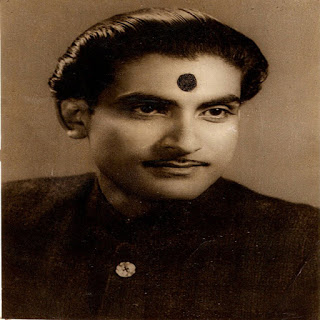
%20-%20front.jpg)
%20-%20back.jpg)
